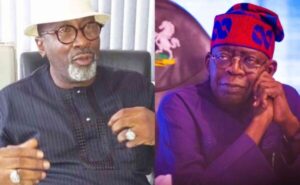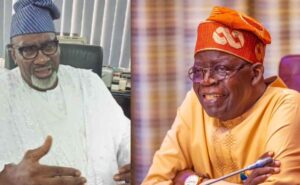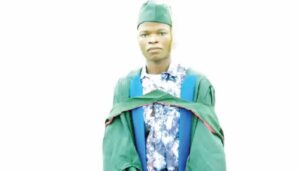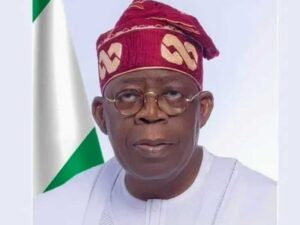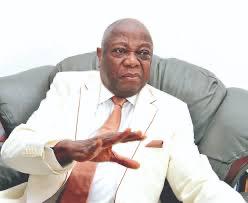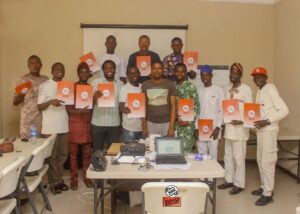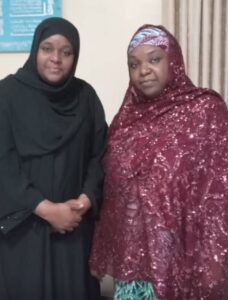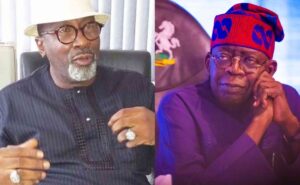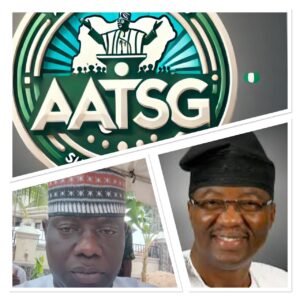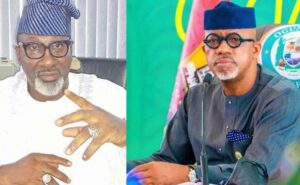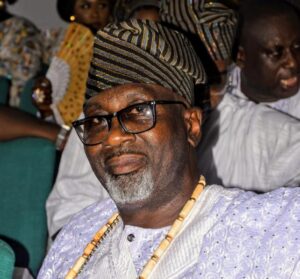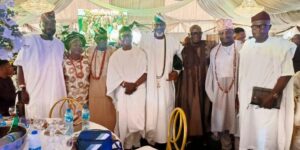For the third time in the life of the 8th National Assembly, Senate President Bukola Saraki survived what looked like a coupagainst the chamber. It was July 24, 2018, the day of drama at the NASS, Abuja. Group Politics Editor, TAIWO ADISA presents the buildup to the dramatic turn, and further periscopes the unfolding scenes.
LIGHTENING, they said does not strike twice at the same spot in the same manner. But in the case of the current National Assembly of Nigeria, the 8th Assembly, lightening has not only struck twice at the same spot, it has actually struck thrice in succession. And all that within a space of three years.
The first time was on June 9, 2015. The day the current Assembly was inaugurated. The leadership of the ruling All Progressives Congress (APC) had chosen some preferred candidates they believed should lead the two chambers of the 8th National Assembly. But the members-elect believed that the message came late in the day after many of them had got committed to different combatants on the field. The day came and went without the wish of the ruling party coming to pass. The Senate elected Dr. Bukola Saraki as its President, Ike Ekweremadu as the Deputy while the House elected another man who was not on the shopping list of the APC, Hon Yakubu Dogara as well as Hon Lasun Yusuf as his Deputy. That election was like a defeat for the APC, which had set the dragnet to cage Saraki, the ringleader of the rebellion. The meeting called by the leadership of the party to rein in the Senators-elect and members-elect as well failed as Saraki and his like minds in the Peoples Democratic Party (PDP) and the APC alike outsmarted the plot.
After beating the APC in its own game the first time, with Saraki actually escaping to the National Assembly as early as 6a.m., many had thought that the party would beat a retreat and seek to fight another day. But the acrimony was allowed to linger and the division continued to expand.
On April 18, another attempt to cut the Saraki gang to size unfolded this time in the Senate. It was the second strike of the lightening. Some hoodlum-looking chaps sauntered into the Senate chamber, while Ike Ekweremadu was presiding. That seized the Mace, the symbol of authority of the chamber and made away with it. It was a strange find, looking at the entire security apparatus that governs the national assembly.

The plot, according to sources then, was that with the seizure of the mace, senators of the PDP who were not in the know of the hidden agenda behind the plot would have scampered away and then a few APC lawmakers would regroup and appoint a leader for themselves. Saraki was then outside the country. The second strike of the lightening again failed to hit the target as the Senators stayed put in the chamber and immediately regrouped to continue the sitting.
Then came July 24. The well-orchestrated plot appeared set to hit. Once Saraki is not in the chamber, and Ekweremadu is caged in his own house, a Senate that would have conveyed at 10 a.m. would not wait in perpetuity for a presiding officer. The lawmakers would have to make do with Senate President pro tempore apparently to hold forth but that could be a terminal destination for the leadership of Saraki and Ekweremadu. The theories were there and the execution appeared to have gone along with the theoretical framework but again, something snapped and Saraki, who was believed to have been caged and locked out of sight surfaced in the chamber and took charge. It was a big blow to a leadership change plot said to have been in the offing by loyalists of the Presidency who were said to have met severally at some high class hotels in Abuja.
Though no one has owned up to the plot, indications from Saraki had given a clear mention of attempts to stop him from appearing at the chamber to prevent the planned defection of some members on the said day. But the plots and attacks did not stop the planned defections. At the end of the sitting of that day, 14 Senators and 37 members of the House of Representatives had ditched the APC for the rival PDP, the African Democratic Congress (ADC) and the United Peoples Party (UPP) among others.
The story of the cat and mouse relationship between the National Assembly and the Presidency dates back to the very day the Assembly was inaugurated and the divisive seed that was planted. That seed had continued to grow branches, leading to feuds and more feuds. Though the proverbial “axis of evil” in this era appeared muted at a stage the mode of operation of that “axis” in the current assembly appears a more deadly than those ever seen in the previous assemblies.
For most of the duration of the Assembly, not even the proprietor or the antagonist can really dictate the direction of the anger. At a time it looks as if the executive was the common enemy. The elections of the leadership of the two chambers were done in defiance of the executive and the political party.

Then the colour of the opposition changed. A splinter group that claims to be loyal to the ruling party broke ranks and appeared to be fanning the embers of discord in the chamber on behalf of the party that felt side-stepped in the leadership recruitment process of June 9, 2015. After that axis had undergone series of modifications and re-engineering, the colour again changed and this time, the 2019 battle appears the driving force. By now the battle line appears to have been clearly drawn and the actors have started identifying the side of the battle field they want to be counted.
The mutation of the dreaded and proverbial “axis of evil” has apparently gone full circle and the events of July 24, 2018 cannot but be hooked on its neck. The day had started in an unusual way. Senate President Saraki had the night before been summoned to the Police Intelligence Response Team (IRT) office in Guzape, Abuja. The late night invitation asked Saraki to appear at the office at 8am for further interrogation on the alleged involvement in the Offa, KwaraState robbery incidence which claimed more than 30 lives in April. It was the second time Saraki would be invited by the Police over that incident and he had kept faith by responding appropriately. But in the morning of July 24, a strange development occurred. As Saraki was heading out of his house to keep a day with police interrogators, a convoy of security operatives blocked his way and prevented him from proceeding on its journey.
Videos of the event immediately went viral on the social media and as that was unfolding, another story broke to the effect that some security operatives have also surrounded the house of the Deputy Senate President, Ekweremadu. Statement from the Media Adviser to the Deputy Senate President, Uche Anichukwu indicated that the police and operatives of the Economic and Financial Crimes Commission (EFCC) had laid siege to Ekweremadu’s house in Apo quarters, Abuja, denying everyone entrance or exit from the street. It later surfaced that Ekweremadu was asked to appear at the head office of the EFCC through a letter dated the same day and possibly delivered at the same time it was being delivered.

It didn’t take too long for watchers of the National Assembly to put things together. If Saraki is being blocked from entering the National Assembly and his deputy, Ekweremadu could not also make it to the chamber, some ominous signals are certainly afoot. The rules of the Senate guarantee that with 37 out of 109 Senators on the floor of the Senate at a particular sitting, quorum is formed and that number could conduct the business of the chamber. With the Senate, if not the National Assembly divided along the lines of pro-Senate President Bukola Saraki and loyalists of President Muhammadu Buhari in the past months, the tendency for “anything can happen” became

widespread.
It was thought that something could happen on July 24. Both camps in the battle were warming up. While the Buhari Support Group in the National Assembly was holding spirited meetings, those loyal to the opposition were also strategising. The indication was that the pro-establishment team would be able to outwit the Saraki caucus with the heavy security cordon of the two key leaders – Saraki and Ekweremadu. With the failed third attempt at reclaiming the Parliament for the APC, not a few public commentators have condemned what looked like strong-arm tactics. The key opposition PDP has called for a cessation of attacks on the National Assembly, while its presidential hopeful, former number two citizen, Atiku Abubakar also joined the condemnation fray.
Senator Enyinnaya Abaribe, a recent victim of the Department of State Security, who is the spokesman of the PDP and South-East caucus in the Senate fired a statement condemning the development. He said that well-meaning Nigerians must save the country from tyranny and fascism.
He said: “This dangerous route is unprecedented in the modern democracy. It is a sinister plot to throw the country back to the dark age of military dictatorship. Too bad for our unity as a country.
“The legislature is the universally acclaimed bastion and symbol of democracy, so attacking this hallowed institution signals the end to our chequered match to enduring democracy.”

The Civil Liberties Organisation (CLO) also accused the government of orchestrating dictatorship. A statement by its President, Igho Akeregha said that the siege to the homes of Saraki and Ekweremadu amounted to a rapid slide into anarchy, dictatorship and incivility which it said Nigeria is being plunged by the current administration.
“The siege, by the police and operatives of the Department of State Services (DSS) to the Abuja residences of the Senate President, Dr. Bukola Saraki and Deputy Senate President, Ike Ekweremadu on Monday night was apparently ordered by the administration to avert defection of some Senators who are dissatisfied with the growing undemocratic practices within the ruling All Progressives Congress(APC).
“We commend the 15 Senators who demonstrated courage in the face of adversity to abandon the ship of dictatorship and urge them to pursue their future political objectives in the general interest and good of Nigerians.The National Assembly leadership must not bow to the unpopular and prebendal strategy of the executive to weaken its powers but stand firm to defend democracy.
“The CLO and indeed many Nigerians who made huge sacrifices to enthrone democracy are daily confronted with extreme brigandage and lawlessness promoted by the Buhari administration. Citizens should now stop this dangerous drift.”

APC speaks on NASS crisis
But the APC appeared unperturbed by the game of musical chairs around its majority seats in the National Assembly. A statement by its spokesman, Bolaji Abdullahi, said that the development in the National Assembly was not worrisome.
It said: “In the last couple of weeks, our party leaders have worked to stave off this situation as responsible party leaders would do. It would appear, however, that the individuals involved have different considerations beyond the grievances that they were willing to discuss and which our leaders were willing to address.
“As a truly democratic party, we respect the right of every citizen to political association. Therefore, we urge our members to remain calm as we continue to work hard to position our party strongly for the next general elections. APC remains in firm control of 25 states of the 36 states of the federation and maintains a clear majority in the federal House of Representatives and state assemblies.
“We assure members and supporters that our great Party will continue to consolidate on our majority status in the lead-up to the 2019 General Elections, even as our government continues to work hard to deliver on our promises to Nigerians.”
Game of numbers
In the early hours of July 24, it came across that the PDP had gained majority in the Senate and with the loss of 37 members in the House of Representatives, it appeared that the party had equally lost the leadership of the Green chamber. But clarifications from the House Leader, Honourable Femi Gbajabiamila indicated that the APC still maintained its leadership of the House.

Gbajabiamila told newsmen that after the defection of the 37 law makers elected under the platform of the APC, the APC caucus in the House could not lose its majority as according to him, the PDP needed 60 law makers to become the majority in the House.
The Senate, however, took its time to make a comprehensive response on the game of numbers. Senate leader, Ahmed Lawan, who addressed newsmen late in the day on Tuesday, said that the APC still “maintains the majority in the Senate after the defection of 14 APC Senators to the PDP.”
Senate Leader, Ahmed Lawan said that after a proper stock-taking by the Senators, it was confirmed that the APC has 52 senators while the PDP has 50.
He said that the remaining five existing seats are shared by Senators on the platform of African Democratic Congress (ADC), which has three and All Progressives Grand Alliance (APGA) with two senators.
He was optimistic that the 52 seats now held by the APC may increase to 54 next month after the conduct of slated bye elections for Bauchi South and Katsina North Senatorial Districts. He was of the view that the two districts were APC strongholds.
The list of Senators as revealed by Lawan indicated that those belonging to the APC include the entire 3 Senators from Kebbi State, 2 from Sokoto, 3 from Zamfara, 2 from Katsina , 2 from Kano, 2 from Jigawa, one from Kaduna , 2 from Yobe and the entire 3 senators from Borno State.
Others are the entire 3 senators from Niger State, one from Nasarawa, one from Benue, one from Plateau, one from Edo, 2 from Rivers, one from Delta and one from Cross Rivers State.

Others who remain on the ticket of the party in the senate also include one from AkwaIbom State, one from Anambra, one from Ebonyi, two from Imo, one from Gombe, two from Adamawa, one from Taraba, the entire three senators from Lagos and Ondo States, two from Ogun, and two from Oyo and one from Ekiti State.
Lawan said: “Though it is with heavy heart, we received the news of defection of some of our members to PDP today but in spite of that, the 52 of us remaining in the party in the Senate for now. We continue to projects its image, supports its programmes and stand by President Muhammadu Buhari government and its various policies geared towards transforming the country for the good of the common man.”
Those who had defected on the floor of the Senate on July 24 included 14 in all including Senators Dino Melaye (Kogi West), Barnabas Gemade (Benue North East), Abdullahi Danbaba ( Sokoto South), Mohammed Shaaba Lafiagi (Kwara North), Rafiu Ibrahim (Kwara South) and Suleiman Hunkuyi (Kaduna North).
Others are Hamman Isa Misau (Bauchi Central), Monsurat Sunmonu ( Oyo Central), Usman Bayero Nafada (Gombe North), Rabiu Musa Kwankwaso (Kano Central), Suleiman Nazif (Bauchi North), Lanre Tejuoso, whose defection is still enmeshed in controversy (Ogun Central), Abdulaziz Nyako (Adamawa Central) and Ubali Shittu ( Jigawa North-East).
Watchers of the National Assembly believe that the last is not yet heard on the game of numbers in the Senate and the House of Representatives. Intense lobbying by the APC and the PDP has continued to ensure undulating figures. Many believe that local politics and pressure from powers that be had stemmed the number of defectors initially put at 24 to the manageable 14. Right now, intense politicking and lobbying have become the order of the day.
But as the primaries ahead of the 2019 elections draw close, the die surely would be cast and each lawmaker would have to stand behind a particular line, whether that would be the broom-wielding APC or the umbrella-holding PDP would be determined in matter of weeks.


